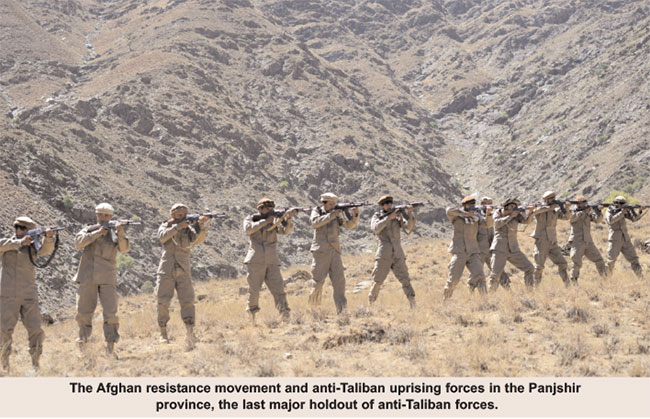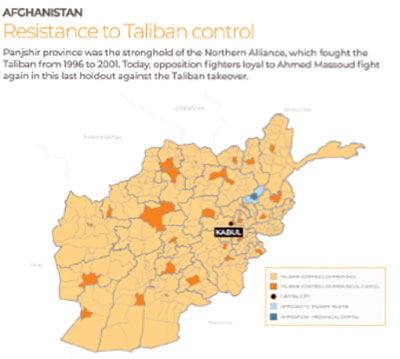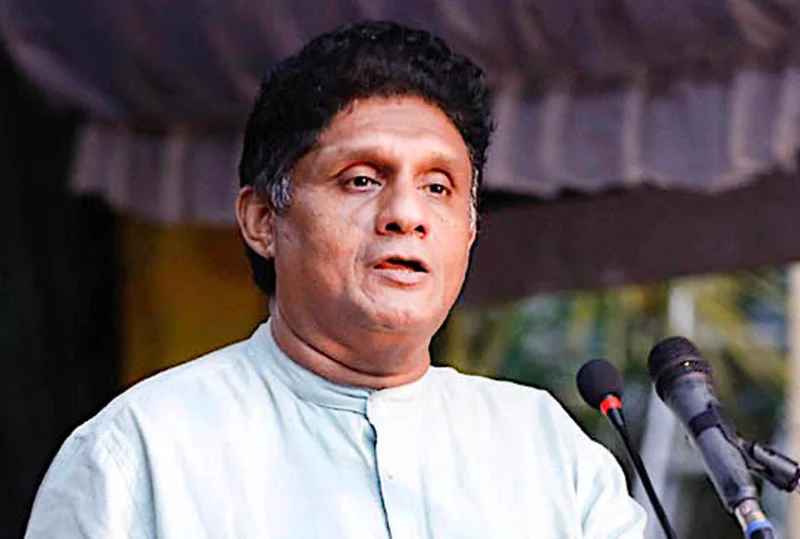News
Afghanistan: Panjshir forces claim hundreds of Taliban captured

(Al Jazeera) Taliban and opposition forces continue to battle to control the Panjshir Valley north of Kabul with resistance fighters saying they captured hundreds of Taliban troops.
The National Resistance Front (NRF) of Afghanistan, grouping forces loyal to local leader Ahmad Massoud, said on Sunday it surrounded “thousands of terrorists” in Khawak Pass and the Taliban abandoned vehicles and equipment in the Dashte Rewak area.
Al Jazeera’s Charles Stratford, based in the capital Kabul, reported sources on the ground said hundreds of Taliban fighters had been taken prisoner on Sunday.
“Sources within the valley are saying the NRF are claiming to have captured about 1,500 Taliban. Apparently, these fighters were surrounded,” said Stratford.
Dashti wrote on Twitter that Paryan district had been completely emptied of Taliban fighters.
 Nearly 1,000 Taliban fighters were either killed, wounded, or taken captive after the exit route behind them was closed off, Dashti said. The information could not be verified independently.
Nearly 1,000 Taliban fighters were either killed, wounded, or taken captive after the exit route behind them was closed off, Dashti said. The information could not be verified independently.
Meanwhile, Taliban spokesman Bilal Karimi said on Twitter on Sunday its forces seized five of the province’s seven districts.
Karimi said Khinj and Unabah districts had been taken, he said.
“The Mujahideen [Taliban fighters] are advancing toward the centre [of the province],” he wrote.
Panjshir is the last Afghan province holding out against the armed group that swept to power last month.
Both sides claimed to have the upper hand in Panjshir but neither could produce conclusive evidence to prove it. The Taliban was unable to control the valley when it ruled Afghanistan from 1996 to 2001.
US General Mark Milley, chairman of the Joint Chiefs of Staff, underscored the tenuous situation.
“My military estimate is, is that the conditions are likely to develop of a civil war. I don’t know if the Taliban is going to be able to consolidate power and establish governance,” Milley said.
If the Taliban cannot quash resistance, it will “in turn lead to a reconstitution of al-Qaeda or a growth of ISIS or other myriad of terrorist groups” over the next three years, said Milley.
Emergency, an Italian medical aid organisation, said Taliban forces had pushed further into the Panjshir Valley on Friday night, reaching the village of Anabah where the group has medical facilities.
Bill Roggio, managing editor of the US-based Long War Journal, said on Sunday there was still a “fog of war” with unconfirmed reports. Both sides claim to have inflicted heavy losses on each other.
“The Taliban army has been hardened with 20 years of war and make no mistake, the Taliban trained an army,” Roggio tweeted, adding “the odds were long” for the Panjshir resistance.
“The Taliban army was injected with a massive amount of weapons and munitions after the US withdrawal and collapse of the ANA [Afghan National Army],” he added.
Ali Maisam Nazary – who is not in Panjshir but remains a spokesman for the resistance – said the resistance force “will never fail”.
But former Vice President Amrullah Saleh, who is holed out in Panjshir alongside Massoud – the son of legendary anti-Taliban commander Ahmad Shah Massoud – warned of a grim situation.
In a statement, Saleh spoke of a “large-scale humanitarian crisis” with thousands “displaced by the Taliban onslaught”.
Pro-Taliban social media have boasted of capturing swaths of the valley, but Nick Waters from the investigative website Bellingcat said the posts did not include verifiable photographs to back up the claims.
“It will be quite easy to verify a video showing Taliban within the Panjshir valley,” Waters said.
The Panjshir Valley, surrounded by jagged snow-capped peaks, offers a natural defensive advantage, with fighters melting away in the face of advancing forces, then launching ambushes firing from the high tops down into the valley.
News
Prez seeks Harsha’s help to address CC’s concerns over appointment of AG

Chairman of the Committee on Public Finance (CoPF), MP Dr. Harsha de Silva, told Parliament yesterday that President Anura Kumara Dissanayake had personally telephoned him in response to a letter highlighting the prolonged delay in appointing an Auditor General, a vacancy that has remained unfilled since 07 December.
Addressing the House, Dr. de Silva said the President had contacted him following the letter he sent, in his capacity as CoPF Chairman, regarding the urgent need to appoint the constitutionally mandated head of the National Audit Office. During the conversation, the President had sought his intervention to inform the Constitutional Council (CC) about approving the names already forwarded by the President for consideration.
Dr. de Silva said the President had inquired whether he could convey the matter to the Constitutional Council after their discussion. He stressed that both the President and the CC must act in cooperation and in strict accordance with the Constitution, warning that institutional deadlock should not undermine constitutional governance.
He also raised concerns over the Speaker’s decision to prevent the letter he sent to the President from being shared with members of the Constitutional Council, stating that this had been done without any valid basis. Dr. de Silva subsequently tabled the letter in Parliament.
Last week, Dr. de Silva formally urged President Dissanayake to immediately fill the Auditor General’s post, warning that the continued vacancy was disrupting key constitutional functions. In his letter, dated 22 December, he pointed out that the absence of an Auditor General undermines Articles 148 and 154 of the Constitution, which vest Parliament with control over public finance.
He said that the vacancy has severely hampered the work of oversight bodies such as the Committee on Public Accounts (COPA) and the Committee on Public Enterprises (COPE), particularly at a time when the country is grappling with a major flood disaster.
As Chair of the Committee responsible for overseeing the National Audit Office, Dr. de Silva stressed that a swift appointment was essential to safeguard transparency, accountability and financial oversight.
In a separate public statement, he warned that Sri Lanka was operating without its constitutionally mandated Chief Auditor at a critical juncture. In a six-point appeal to the President, Dr. de Silva emphasised that an Auditor General must be appointed urgently in the context of ongoing disaster response and reconstruction efforts.
“Given the large number of transactions taking place now with Cyclone Ditwah reconstruction and the yet-to-be-legally-established Rebuilding Sri Lanka Fund, an Auditor General must be appointed urgently,” he said in a post on X.
By Saman Indrajith
News
Govt. exploring possibility of converting EPF benefits into private sector pensions

The NPP government was exploring the feasibility of introducing a regular pension, or annuity scheme, for Employees’ Provident Fund (EPF) contributors, Deputy Minister of Labour Mahinda Jayasinghe told Parliament yesterday.
Responding to a question raised by NPP Kalutara District MP Oshani Umanga in the House, Jayasinghe said the government was examining whether EPF benefits, which are currently paid as a lump sum at retirement, could instead be converted into a system that provides regular payments throughout a retiree’s lifetime.
“We are looking at whether it is possible to provide a pension,” Jayasinghe said, stressing that there was no immediate plan to abolish the existing lump-sum payment. “But we are paying greater attention to whether a regular payment can be provided throughout their retired life.”
Jayasinghe noted that the EPF was established as a social security mechanism for private sector employees after retirement and warned that receiving the entire fund in a single installment could place retirees at financial risk, particularly as life expectancy increases.
He also cautioned that interim withdrawals from the EPF undermined its long-term sustainability. “Even the interim payments that are given from time to time undermine the ability to give security at the time of retirement,” he said, distinguishing the EPF from the Employees’ Trust Fund, which provides more frequent interim benefits.
Addressing concerns over early withdrawals, the Deputy Minister explained that contributors have been allowed to withdraw up to 30 percent of their EPF balance since 2015, with a further 20 percent permitted after 10 years, subject to specific conditions and documentary proof.
Of 744 applications received for such withdrawals, 702 had been approved, he said.
The proposed shift towards an annuity-based system comes amid broader concerns over Sri Lanka’s ageing population and pressures on retirement financing. While state sector employees receive pensions funded by taxpayers, including EPF contributors, the EPF itself has been facing growing strain as it is also used to finance budget deficits.
Jayasinghe said the government’s focus was to formulate a mechanism that would ensure long-term income security for private sector employees, placing them on a footing closer to a pension scheme rather than a one-time retirement payout.
News
Sajith accuses govt. of exacerbating people’s suffering to please IMF

Opposition Leader Sajith Premadasa yesterday strongly criticised proposals to increase electricity tariffs, warning that the move would deepen the hardships faced by the public already reeling from disasters and rising fuel costs.
Premadasa, who is also the leader of the SJB, told Parliament that the government was considering an electricity price hike at a time when people were struggling to recover from recent crises, while coping with higher fuel prices. He accused the administration of acting contrary to its own election pledges and the expectations of suffering people.
Making a special statement, the Opposition Leader recalled that the government had come to power promising to reduce electricity bills by 30 percent, within three years, by shifting from fuel-based power generation to cheaper renewable sources, such as solar, wind and hydropower. Instead, he said, those commitments had been abandoned.
Premadasa pointed out that the CEB has sought approval from the Public Utilities Commission of Sri Lanka (PUCSL) for an 11.57 per cent tariff increase for the first quarter of 2026 to cover its losses. He questioned whether the government had assessed the impact of such an increase on low- and middle-income households, as well as state institutions.
He also asked why the government had failed to honour its promise to cut electricity tariffs by one-third through a transparent pricing mechanism.
The Opposition Leader further criticised the limited time allocated for public consultations on the proposed new energy policy, saying it was unfair and should be extended, particularly given the prevailing national crises.
Premadasa warned that the removal of competitive tariff structures for industries would be unjust to large-scale consumers using more than five million units of electricity, and called for comparative reports before any subsidies are withdrawn.
He added that despite earlier assurances to reduce electricity bills by 33 percent, the government has once again increased fuel prices, even as global fuel prices decline, continuing, what he described as, a pattern of broken election promises.
Accusing the government of being constrained by International Monetary Fund (IMF) conditions, Premadasa said the simultaneous increases in fuel and electricity prices were exacerbating the economic burden on the public.
By Saman Indrajith
-

 News1 day ago
News1 day agoBroad support emerges for Faiszer’s sweeping proposals on long- delayed divorce and personal law reforms
-

 News2 days ago
News2 days agoPrivate airline crew member nabbed with contraband gold
-

 News1 day ago
News1 day agoInterception of SL fishing craft by Seychelles: Trawler owners demand international investigation
-

 News4 days ago
News4 days agoHealth Minister sends letter of demand for one billion rupees in damages
-

 Opinion6 days ago
Opinion6 days agoRemembering Douglas Devananda on New Year’s Day 2026
-

 Features2 days ago
Features2 days agoPharmaceuticals, deaths, and work ethics
-

 News1 day ago
News1 day agoUS raid on Venezuela violation of UN Charter and intl. law: Govt.
-

 Features1 day ago
Features1 day agoEducational reforms under the NPP government













